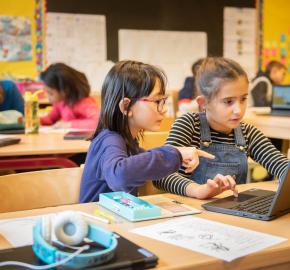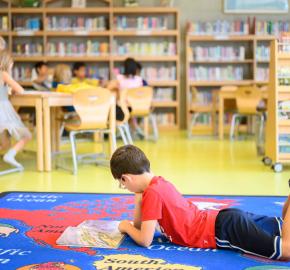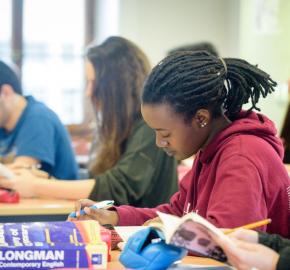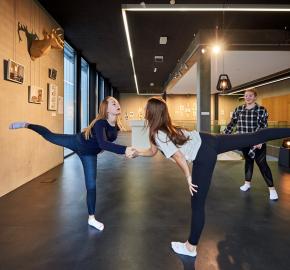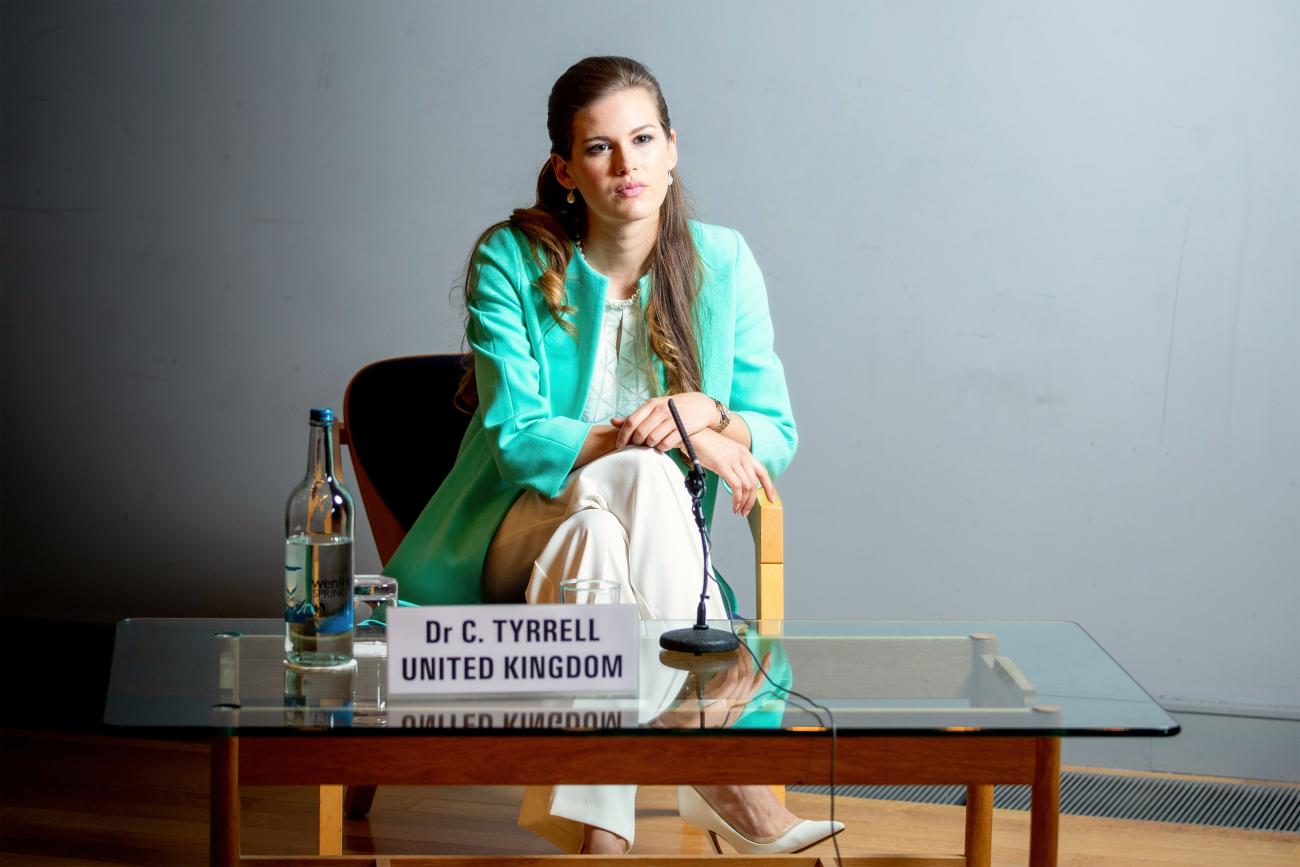
Ecolint alumna Dr. Carina Tyrrell (La Châtaigneraie 2008) is a British-Swiss public health physician and a research scientist fellow at Cambridge University. She was recently featured on the front page of The Times – talking about her work leading on COVID-19 antibody detection, COVID-19 management in intensive care, and identifying COVID-19 vaccine and therapeutic trials with Oxford University. Carina has worked with local and national government and international organisations such as the World Health Organization, where she co-authored international policy documents and published work on emerging respiratory virus outbreaks. As an Entrepreneur-in-Residence for healthcare-focused venture capital firms, her work is driving the translation of technology into healthcare systems and the adoption of digital healthcare delivery. Carina graduated from Cambridge University with a first-class degree in medicine and a Master of Public Health with distinction.
What brought you to philanthropy and what inspired you to become an ambassador for homeless charities?
My interest in philanthropy was seeded by growing up in the international community of Geneva, one of the most important philanthropic hubs globally, and having parents striving to improve health worldwide and discover the origins of the universe through their work at the World Health Organization (WHO) and CERN, respectively. The Ecolint spirit to educate students to be “global citizens” to create a “just and joyful tomorrow together” very much reinforced this.
The first philanthropic projects I supported were introduced to me through La Châtaigneraie, including the India humanitarian trip. These experiences and environment motivated my interests in medicine, global health, and the promotion of human welfare. At Cambridge, studying medicine, I wanted to contribute to the local community and was struck by the homeless I saw on my way to and from lectures. The homeless have higher premature mortality and higher prevalence of physical and mental health problems compared to the general population, yet they are often neglected and infrequently access healthcare services. I started by volunteering at one of the homeless shelters and began providing a health education series with fellow student doctors as President of the Cambridge University Global Health Society.
In 2014, when I became Miss United Kingdom, I used my platform to raise awareness of homelessness by sleeping rough on the streets of Cambridge. There remains a lack of awareness of the scale and definition of homelessness, which includes those sleeping in tents, cars, and on sofas in friends’ houses. Nobody should be homeless in the 21st Century, let alone in Western countries.
How about your global health research and humanitarian projects around the world? Could you tell us more about those?
I have been working in scientific research for a number of years, from laboratory-based identification of viral therapeutic targets, to outbreak response at the WHO where I co-authored international policy documents on data sharing, research, and innovation, and published work on emerging respiratory virus outbreaks.
Following the COVID-19 outbreak, the race for a vaccine and therapeutics began, and within three months there were over 700 trials being conducted around the world! With colleagues, I published a review of COVID-19 vaccine and therapeutic trials with Oxford University, where we predict how reliable the trials are in order to ensure a vaccine is suitable for everyone. Ultimately, to eliminate duplication among trials and to direct funding.
While vaccine trials have been taking place, preventing the spread of infection has been critical. I have helped to investigate ways to detect pre-symptomatic infection with SARS-CoV-2 with Cambridge University. With a smartphone App, we are conducting a study where we remotely measure heart and respiration rate, oxygen levels, and temperature in a population. I am also leading a validation study allowing people to take a blood sample at home without the need of a clinician in order to detect COVID-19 antibodies.
An important part of the pandemic has been modelling the spread of disease and informing capacity plans to improve healthcare delivery. With colleagues at the Cambridge Judge Business School and Public Health England, we developed a model to affect real-time decision-making. A very difficult issue during the pandemic has been how to best care for patients requiring intensive care and what to do when there are not enough beds. In a state of the art review BMJ Journal paper, fellow researchers and I discussed the ethical challenges and compared how countries were handling this differently, providing guidance to support front-line clinicians.
Prior to COVID-19, I was fortunate to be able to join different research and humanitarian teams around the world. In Rwanda, I joined doctors from LuxAid working in remote areas treating women for HIV and undertaking research to prevent viral transmission from mother to child. In Ghana, I joined researchers at the Noguchi Memorial Institute for Medical Research, undertaking research on infectious diseases including malaria and schistosomiasis in school children. Treating the school children was a highlight, despite having to collect many stool and urine samples! With the Alfredo da Matta Foundation and the National Foundation for Indigenous People’s Health (FUNASA) in Brazil, I visited river-side communities and observed syphilis diagnostic testing for prenatal screening. A single dose of penicillin can treat early stage syphilis but unfortunately the antibiotic was not available to many women at risk of serious pregnancy complications, including fetal death. At the Oswaldo Cruz Foundation in Brazil (Fiocruz), I joined doctors in the leprosy clinic and witnessed the stigma attached to the disease. During the Ebola outbreak, I supported MSF UK with their social media advocacy and call for funds.
With so many communicable disease threats to health, both known and unknown, ongoing research is critical to finding new treatments and predicting and preparing for future threats. Developing resilient healthcare systems is paramount.
In your opinion, which of the 3 T’s (time, talent, treasure) of philanthropy is the most important and beneficial? Why?
All three play an important role in philanthropy and are needed together to generate impact. However, “time” holds particular importance because it is something that everyone can give – you do not need to have a particular talent or finances to engage in philanthropy. Much of my philanthropic engagement was initially focused on giving my time to fundraising events or volunteering. At school, I volunteered at a local établissement médico-social (retirement home) which contributed to my service work for the International Baccalaureate diploma. Every Saturday morning, I went and helped residents get out of bed and ready for the day, and assisted those who could not eat by themselves at breakfast. All that was required was my time, patience, empathy, and understanding.
I gained many valuable skills and insights whilst volunteering on different projects, and so benefitted through my own personal development. It is an opportunity to meet great people and discover interests, be it healthcare, animal welfare, or climate change and the environment.
Now working as a public health physician, how do you connect your day-to-day work with philanthropy?
Public health is the science of protecting and improving the health of people and their communities. Philanthropy is promoting the welfare of others. I was drawn to public and global health because of the focus on improving people’s lives by improving health. An important part of this is reducing health inequalities. The desire to promote health and wellbeing has been a thread through much of the work I have done, including philanthropic projects and specialising in public health.
This overlap between my work in public health and philanthropy is advantageous when it comes to supporting health-related charities, humanitarian missions, or mentoring healthcare start-ups. I can use my time and my medical training to have a greater impact. One of the non-profit roles where I am able to achieve this is being a Council Member for the Royal Society of Medicine for Public Health, supporting the understanding of the occurrence and character of diseases in populations and the means for their prevention.
Which of your philanthropic actions are you most proud of?
I am supporting a healthcare, technology and impact investment firm in London, RYSE Asset Management. As an Entrepreneur-in-Residence I support mission-driven entrepreneurs to tackle the challenges of healthcare in a venture philanthropy model. The pandemic has highlighted the importance of being able to deliver healthcare using technology and has demonstrated how virtual care can increase access, reduce cost, and improve the quality of care. I am driving the validation of digital healthcare technologies, helping companies to find innovative ways of providing remote care, and supporting entrepreneurs to deliver measurable positive social impact.
Specifically, I have developed impact metrics that are focused on achieving the United Nations Sustainable Development Goals and overcoming global healthcare challenges. These challenges are to improve access to medicines and medical diagnostics, improve data quality for policy and decision-making, improve the supply of essential services and products, and reduce the financial barriers to healthcare services. The companies of tomorrow will incorporate risk, return, and impact into their governance structure and business models.
This venture philanthropy investment will generate positive impact and improve human welfare for generations to come. By creating sustainable companies with social impact as a core part of their mission, we will be able to overcome the challenges of an aging and growing population with increasing complex health needs. Venture philanthropy allows me to contribute my time, skills, and capital to scaling high-impact products and services to meet the healthcare demands of populations globally.
Has your education at Ecolint played a role in shaping your view of and commitment to philanthropy?
The Ecolint spirit is particularly powerful and fosters global citizens. Much of my initial engagement in philanthropy came as a result of Ecolint. I supported Terre des Hommes by participating in the “Marche de l’Espoir” and ran 50km one year! In 2005, I went to Kodaikanal, India, to help the crèches that Ecolint has been supporting for a number of years. Teaching the children the importance of hand hygiene and visiting a neglected village with poor access to healthcare made me reflect on the importance of universal health coverage. The following year, I participated in the 4th “International Schools Association Youth Leadership Seminar on Global Issues” in Ghana. The school fashion show to raise funds for the Global Harmony Foundation was a particular highlight!
An Ecolint education teaches students to think beyond themselves and that the unachievable can be achieved with work and determination. I was given the Alumni Award when graduating from Ecolint and at the time felt a sense of responsibility to continue to foster a spirit of solidarity and camaraderie. Ecolint provided me with a realistic view of the world and gave me the tools to be able to contribute to developing sustainable and resilient communities.
What do you believe would make a difference in the world?
The pandemic has accelerated the use of technology and digitalisation in healthcare delivery which has had a huge impact on this pandemic and will help prepare us for the next one. Specifically, across virtual consultations, remote monitoring, effective use of global healthcare data, and enhanced prediction modelling.
Personalised healthcare data will revolutionise the way we think about healthcare delivery. With better data collection tools, interoperable platforms, and analytic power, we can improve the health of populations and individuals. Some of the benefits include improved communicable disease surveillance and personalised medicine.
Using standardised study methods across the globe enables researchers and scientists to combine data on participants, thereby increasing study sample sizes and statistical power. The importance of this has been highlighted during the pandemic, including in the study conducted with colleagues at Oxford University assessing vaccine and therapeutic trials for COVID-19.
Having worked with international organisations on data-sharing platforms, there is more to be done, particularly regarding cross-border interoperability, and data protection. Whilst supporting work at the WHO related to the Zika virus outbreak, the challenges of secure data sharing platforms, accessibility, and authorship of research findings were highlighted. An important step will be patients controlling and deriving real benefit from their real-time healthcare data.
What kind of legacy do you wish to leave behind?
We are in a healthcare revolution, and technology has played a large part in modernising this industry. Our opportunity is to achieve universal health coverage through the use of digital healthcare technologies which can increase access, reduce cost, and improve the quality of care. To achieve this, progress can be made in overcoming the unique set of challenges that the healthcare sector presents for innovation. These include a requirement for prolonged validation trials, complex regulation, ethical considerations, and a highly trained workforce to tackle the issues we face.
It is critical to align incentives so that healthcare stakeholders can effectively work together to overcome these challenges. Research institutes and healthcare providers deliver an important test bed to demonstrate effectiveness, while commercial companies bring market and supply chain considerations together. Collaboration and integration enables us to harness these different skill sets. The pandemic has fostered some exciting technology and academic collaborations, including our COVID-19-focused study at Cambridge University in partnership with leading digital healthcare companies.
Encouraging innovation is paramount. Sir Greg Winter, a Cambridge-based Nobel prize winner, has demonstrated how innovation can be fostered in educational settings, through his research work and subsequent successful spin-out companies, creating an exciting trend for the future of healthcare. The widespread adoption of innovation in healthcare, through clinical entrepreneurial education and practice, global healthcare stakeholder collaborations, and validation of digital healthcare technologies, are challenges I hope to help overcome during my lifetime.
